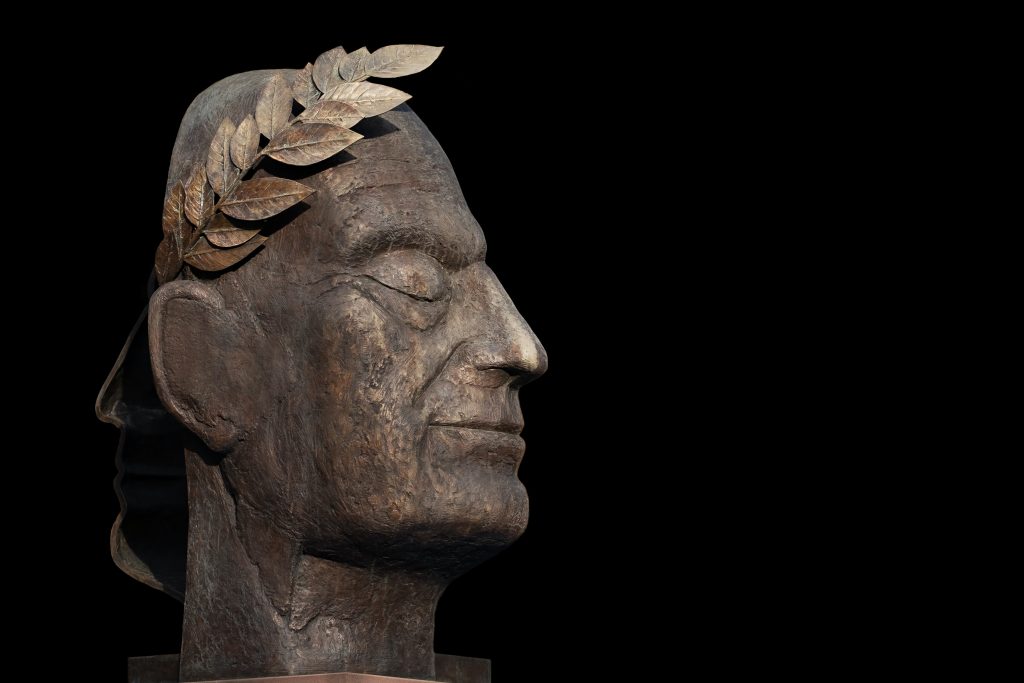
Photo by Ilona Frey on Unsplash
Friends, Romans, lend me your ears.
So much of this famous play has seeped forever into our collective reference that it’s hard to remember it’s theater. The conspiracy gone awry, adapted for the stage, still lands. People are, after all, people, and have always have so, technology notwithstanding. The human spirit reigns consistent.
Shakespeare used Plutarch’s Lives as he wrote Julius Ceasar. Plutarch (c. 46-119 CE) set a great number of biographies down for posterity. Have you ever tried to read them, though? I had one errant volume of a set, a slim red thing I bought at the Sand Pointe Naval Armory in Seattle at the Friends of the Library book sale, back when they had such things and paper books were sold and traded. I had the book for years, and tried to read it (in English, obviously) but just had no frame of reference for the giants long past. I obviously did not have the volume that included Julius Caesar’s life story. O Plutarch, who have us histories of men long dead, incomprehensible even in a cogent narrative. Who are these people, what are these battles, what did they do really to deserve this enshrinement in a version of eternal homage?
I come not to bury Caesar but to praise him.
I first read Julius Caesar aloud in 1989 with my classmates in an English classroom in Oklahoma. Actually, I don’t think I had a reading part. I just listened, reading along quietly to myself from our textbook. We had just studied the Greek tragedy Antigone that same semester, grappling in a sophomore way with the difference between natural and positive law. The play so affected me that the following autumn I wrote a derivative play that was my school’s showpiece for the candidacy of president school of the Oklahoma Association of Student Councils. I wrote a play based on this play. I don’t even know where this script is now but my god what I’d give to see it. I wrote the lines and cast all my student council classmates in the various roles. The most beautiful girl, Kathryn Hansen, was cast as Patricia, a Gwyneth-Paltrow-esque patrician (get it?) who filed her nails while everyone else agonized over negotiations with the school administration over permitting an off-campus lunch period to upperclassmen. I had some grand plan at that age to become the state president of all student councils, the capo dei tutti i capi. I cringe to admit this now but these were worthy goals, in that time and place, the person I was then. Yes, friends, in front of an audience of 5 or 10 thousand students, my play based on Shakespeare’s, based itself on Plutarch’s history, was staged. I would reveal the folly in misguided ambition to the Westmoore High School gymnasium full of screaming Oklahoman adolescent leaders!
Yet Brutus says [Caesar] was ambitious / and Brutus is an honorable man.
What drove my teenage, Caesar-esque ambition? Hard to say. A peripatetic childhood that left me without roots left me with a desire to make my mark, in a dynamic Napoléon himself would have surely understood. A frustration with the local culture. A desire to make things better, simpler, cleaner. I wish to be bigger than I was. A wish to see myself reflected in those who would respect me and validate me. Adolescence is complicated enough before you factor in the leadership goals of teens. I was fed a rich and constant diet of the gospel Youth Leadership that would have made an autocrat proud indeed in another time and place.
Needless to say, my derivative drama landed flat in the bleachers. The school that won did so with a schtick that featured one student smearing peanut butter into another student’s armpits, then wiping the greasy buttery armpits down with slices of white bread and feeding them to a third student, crying that they were against “‘pean’ography.” The crowd roared. They loved it. Antony to my Brutus. I watched years of hopes and ambitions fall to dust. I had not connected with my public. I did not mock pornography but instead tried to show how class divisions disenfranchised the greater portion of the people. I was a complete nerd. I am pretty sure I cried that night after the plays were all over. I was ashamed. I was out of touch. I did not want to look my classmates in the eye. I was from another planet.
I had fully manifested my feelings for Shakespeare, but I didn’t know that then. I was, after all, sixteen and living in Tornado Alley. Maybe there should have been a play about that. Oh, right, it’s been done, Dorothy.
It was supposed to have been a comedy skit, Monica. You reprised Shakespeare? What is wrong with you, and more importantly, who permitted you to do such a thing?
Would that someone had told me, The fault … is not in our stars, but in ourselves, that we are underlings.
For this reading I found one of the best Shakespeare productions I have seen to date, mounted by Theatre Classics, a group that specializes in Greek drama and Shakespeare. This cast was incredible, production was spot on, directing was flawless. It felt better produced than many a movie I have sat through. Who are these people? I might have to start the Greek Drama Project after concluding Shakespeare just to watch more of their stagings. Every role was perfectly cast, the diction flawless, the costumes believable, the production professional.
One more point about Shakespeare’s Caesar. With the recent news about the impending Trump indictment, it has led me to consider, what problem are we solving by removing a tyrant? I believe in the rule of law, but as the play illustrates, we so often think we are resolving on problem when in reality we are creating potentially a dozen more that could lead us to places darker than we ever imagined when we envisioned that moment of justice. On a far more petty scale, I have seen innumerable dramas reminiscent of Julius Caesar play out in my time in both corporate America campus administration, and the parallels are amusing indeed. It doesn’t matter where people are. They will act out according to their principles, bound by their flaws and limited by time, and the whole while they will praise themselves and the fallen for being honorable. Anyone who is so glued to the news about the indictments, or to their own intra-office communications about that awful manager or dean or VP, would do well to take a couple of hours and watch this play. Take a few notes. Take a breath.
The fault … is not in our stars, but in ourselves, that we are underlings.
Rereading and watching Julius Caesar offered me a more thorough trip down Memory Lane than I’d bargained for. The shame has receded. Time and place. I am grateful for the vivid memories, tied to the emotions that bind me to such dusty literature. And Anne Kelly, wherever you are now, thank you for seeing a younger me as a rising poet, worthy of publicly reprising none less than the Bard at fifteen, struggling to make it relevant even then in Oklahoma in 1989.
Thanks for bearing with me on this one, readers – obviously it drew out more than anyone bargained for.
Next up – Troilus and Cressida, a play I’ve never seen or read, but I remember the name Cressida from Adam Gopnik’s From Paris to the Moon, which everyone and her sister was reading in Seattle in 2002.



